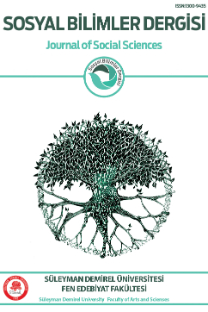Pavlus felsefesinde gizlenen gnostik unsurlar
Gnostic elements hidden in paulinism
___
ANONİM (2004). Kutsal Kitap, İstanbulAYERS Jerry (2010). Yahweh's Breath Bible, London
BUDGE Wallis (2001). Mısırda Ölüm Sonrası Fikri, İzmir
CHURTON Tobias (1987). The Gnostics, London
COUCHOUD Paul Louis (1939). The Creation of Crist, London
DARRELL Brock (2008). Kayıp İnciller, İstanbul
FREKE Timothy ve GANDY Peter (2005). Hz. İsanın Gizemleri, İstanbul
GİOVANNİ Floramo (2005). Gnostisizm Tarihi, İstanbul
GRANT Robert (1959). Gnosticism and early Christianity, New York
GÜNDÜZ Şinasi ( 1999). Sabiiler : Son Gnostikler, Ankara
HANÇERLİOĞLU Orhan (1977). Felsefe Ansiklopedisi Kavram ve Akımlar, İstanbul
HARİS Glyndwr (1999). Gnosticism: Beliefs and Practices, Sussex
JONAS Hans (2001). The Gnostic Religion, New York
KASSER Rodolphe. (2006). The Gospel of Judas, London
KENNETH Hanson (2010). Kayıp İncilin Sırları, İstanbul
MERCAN Şeref, (2003), Gnostik İnciller, İstanbul
PEARSON Behy (2007). Ancient Gnosticism: Traditions And Literature, London
PLATON (1997). Timaios, İstanbul SEAN Martin (2010). Gnostikler : İlk Hıristiyan Sapkınlar, İstanbul
SMİTH Andrew ve HOELLER Stephan (2007). Gnostic Writings on the Soul, New York
- ISSN: 1300-9435
- Yayın Aralığı: 3
- Başlangıç: 1995
- Yayıncı: Süleyman Demirel Üniversitesi, Fen-Edebiyat Fakültesi
Modern edebiyat dünyası ile yüzleşmek: 1900-1920 arası William Dean Howells
Ekspresyonizmde hıristiyanlık ve çarmıhta İsa tasvirinin kullanımı
Pavlus felsefesinde gizlenen gnostik unsurlar
Milli parkların sürdürülebilir kullanımı ve yönetim planı önerisi: Isparta ili örneği
İSMAİL KERVANKIRAN, ADİLE GÜL ERYILMAZ
Kırım Tatar Türkçesi ve Türkiye Türkçesi arasında yalancı eşdeğerler
20. Yüzyıl başlarında İstanbul hapishane -i umumi 'de mahkûmların üretim faaliyetleri
Refet Paşa'nın İstanbul'a Girişi ve tıbbiyelilerce karşılanışı
Satraplık sisteminin pers yönetim teşkilatındaki yeri
Modern bir aydın hareketi olarak yeni Osmanlılar ve islam dünyası
